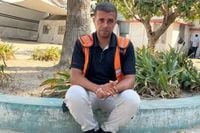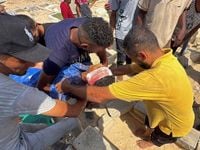On August 10, 2025, Moroccan healthcare professionals launched a hunger strike, standing in solidarity with their embattled colleagues in Gaza and the countless civilians suffering under what they describe as an Israeli-induced starvation campaign and genocidal war. This action, spearheaded by the Moroccan NGO Doctors for Palestine, unfolded across multiple cities in Morocco as part of a broader wave of protests and sit-ins. The demonstrators' demands were unequivocal: an end to what they call systematic starvation policies targeting Palestinians, an immediate cessation of attacks on civilians, and the urgent opening of border crossings to allow the flow of desperately needed food and medical supplies into Gaza. Furthermore, Moroccan medical professionals called for their own government to end all forms of diplomatic normalization with Israel.
The hunger strike in Morocco is just one sign of mounting outrage and solidarity from Arab healthcare workers as the humanitarian catastrophe in Gaza deepens. According to the World Health Organization, at least 94 percent of Gaza's hospitals have been damaged or destroyed since the war began, rendering medical care for victims nearly impossible. The devastation has left Gaza's medical system in shambles, and the few remaining health workers are overwhelmed by the sheer volume of casualties and the lack of resources.
But the crisis in Gaza extends far beyond the walls of its shattered hospitals. As reported by Al Jazeera, on August 9, 2025, tragedy struck again when a 15-year-old Palestinian boy, Muhannad Zakaria Eid, was killed after a pallet of airdropped humanitarian aid crushed him near the Netzarim Corridor in central Gaza. His brother, speaking to Reuters, recounted, “Despite the famine and the hard conditions that we live in, my brother went to get aid that was dropped into the sea by [aero]planes. A box fell on him directly and he was martyred.” The incident is not isolated. The Gaza Government Media Office confirmed that at least 23 Palestinians have died and another 124 have been injured during aid airdrops since October 2023, highlighting the perilous and inefficient nature of these operations.
The United Nations has repeatedly warned that airdrops are both dangerous and insufficient, urging Israel to allow a sustained supply of humanitarian aid through land crossings instead. “We have repeatedly warned of the danger of these inhumane methods and have repeatedly called for the entry of aid through land crossings in a safe and sufficient manner, especially food, infant milk, medicines, and medical supplies,” the Gaza Government Media Office stated. Despite these pleas, severe restrictions on aid persist. The World Food Programme (WFP) recently called on Israel to permit at least 100 aid trucks per day into Gaza, though only a fraction of that number has been allowed, and even vetted aid convoys are frequently turned away or delayed by Israeli authorities.
Meanwhile, the toll of starvation and violence continues to mount. On August 9 alone, Israeli forces reportedly killed at least 47 people across Gaza, including dozens waiting for aid, according to medical sources cited by Al Jazeera. The following day, the Ministry of Health in Gaza reported that five more Palestinians, including two children, had starved to death in a 24-hour period. Since the outbreak of war, at least 217 people, including 100 children, have died from malnutrition, with most deaths occurring in recent weeks as Israel maintains tight restrictions on aid flows.
Leaked Israeli cabinet minutes, as reported by Qassam Muaddi, have added fuel to the international outcry. These documents reveal that Prime Minister Benjamin Netanyahu and his cabinet deliberately chose starvation as a weapon of war, rejecting a potential ceasefire in favor of using hunger to force Hamas’s surrender. Tareq Hajjaj, reporting for Al Jazeera, described how Israel is “engineering chaos” in Gaza’s aid system, with Israeli forces allegedly shooting at civilians seeking food and allowing looters to operate freely, ensuring aid does not reach those most in need.
This policy, openly discussed for nearly two years and still embraced by senior Israeli figures, is now eroding Israel’s legitimacy on the world stage. As noted by Al Jazeera, the International Sociological Association recently suspended the Israeli Sociological Society, marking an escalation in the global academic boycott of Israel. In the United States, political attitudes are shifting as well, with Bernie Sanders’s recent—though unsuccessful—resolutions to block weapons sales to Israel indicating that Palestine is fast becoming a litmus test within the Democratic Party.
Yet, inside Israel, a different mood prevails. According to a new poll by the Israel Democracy Institute, 79 percent of Jewish Israelis are not troubled by reports of famine and suffering in Gaza. This normalization of atrocity, as some analysts describe it, has emboldened Netanyahu, who has now ordered the army to expand the war and reoccupy the entire Gaza Strip. The consequences of such a move are dire. Nearly a million people are currently sheltering in Gaza’s largest city, and international condemnation is growing over Israel’s plans to seize the city in an operation that could forcibly displace hundreds of thousands of Palestinians.
Foreign ministers from Australia, Germany, Italy, New Zealand, and the United Kingdom issued a joint statement warning that Israel’s plan “will aggravate the catastrophic humanitarian situation, endanger the lives of the hostages, and further risk the mass displacement of civilians.” Turkish Foreign Minister Hakan Fidan echoed these concerns, calling Israel’s intention to fully occupy Gaza “a new phase of Israel’s expansionist and genocidal policy.” Fidan stated, “Palestine belongs to the Palestinians. Any effort aimed at expelling Palestinians from their own lands is null and void and is doomed to fail.”
On the ground in Gaza, despair and defiance intermingle. Umm Imran, a Gaza City resident, told Al Jazeera, “They say go south, go to al-Mawasi, but there is nowhere safe any more – north, south, east or west. No one and nowhere is safe. We will stay here.” As Israel’s military escalation looms, residents brace for what may come next, uncertain whether their city—and their lives—will survive the coming days.
In the midst of this turmoil, the hunger strikes, protests, and calls for accountability from across the globe reflect a growing movement demanding justice and relief for Gaza. Whether this groundswell will be enough to break the siege remains to be seen, but the world is watching as the humanitarian crisis grows ever more acute.


